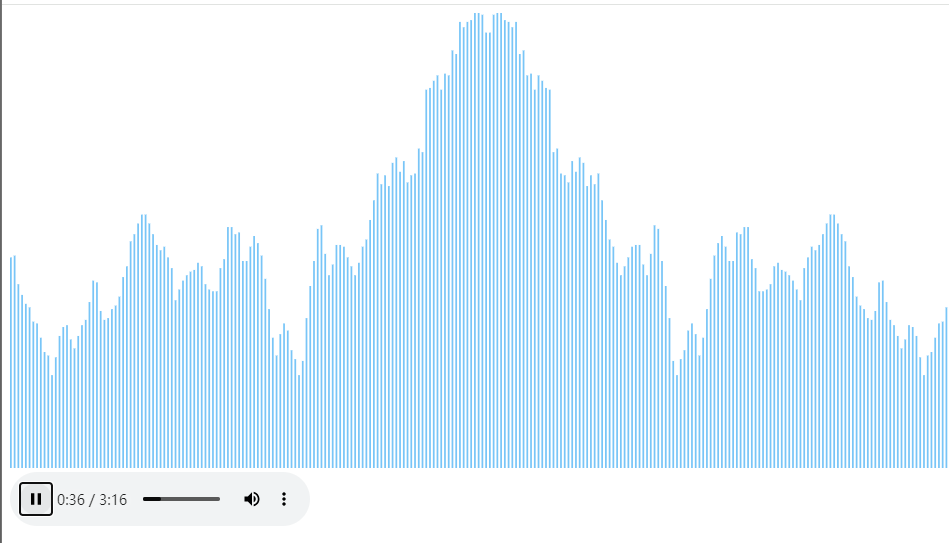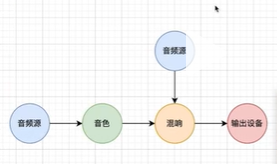综合案例 --- 音频可视化
1. 效果图

2. 知识点
1. 音频节点
就是音频处理中的一个环节, 源节点表示音频数据的来源, 一个音频的所有处理流程就是音频上下文

2. 频谱分析

3. 代码实现
index.html
<!DOCTYPE html>
<html lang="en">
<head>
<meta charset="UTF-8">
<title>Title</title>
<link rel="stylesheet" href="./index.css">
</head>
<body>
<canvas></canvas>
<audio src="./1.mp3" controls></audio>
<script src="./index.js"></script>
</body>
</html>
index.js
const audioEle = document.querySelector("audio");
const cvs = document.querySelector("canvas");
console.log(cvs)
const ctx = cvs.getContext("2d")
// 初始化 canvas 的尺寸
function initCvs() {
cvs.width = window.innerWidth * devicePixelRatio;
cvs.height = (window.innerHeight / 2) * devicePixelRatio;
}
initCvs()
let isInit = false
let dataArray, analyser
audioEle.addEventListener("play", function () {
// 初始化
if (isInit) return;
// 初始化
const audCtx = new AudioContext(); // 创建一个音频上下文
const source = audCtx.createMediaElementSource(audioEle); // 创建一个音频源节点
analyser = audCtx.createAnalyser() // 创建一个分析器节点
analyser.fftSize = 512; // 设置做快速傅里叶变换的窗口大小, 默认2048, 必须是2的n次幂
dataArray = new Uint8Array(analyser.frequencyBinCount) // 创建字节数组,用于接收分析器节点的分析数据
source.connect(analyser); // 将源节点连接到分析器节点
analyser.connect(audCtx.destination); // 将分析器节点连接到输出设备节点
isInit = true;
});
// 把分析出的波形, 绘制到 canvas 上
function draw() {
requestAnimationFrame(draw); // 随着音乐的播放, 不断绘制
// 清空画布
const {width, height} = cvs;
ctx.clearRect(0, 0, width, height);
// 让分析器节点分析出数据到数组中
if(!isInit) return;
analyser.getByteFrequencyData(dataArray)
const len = dataArray.length / 2; // 由于很多高音部分,人的耳朵是听不到的, 所以要放大两倍
const barWidth = width / len / 2; // 每条的宽度, 后面要画对称图形, 所以 再除以2
ctx.fillStyle = "#78C5F7" // 画笔颜色
for (let i = 0; i < len; i++) {
const data = dataArray[i];
const barHeight = data / 255 * height; // 每条的高度
const x1 = i * barWidth + width / 2; // 右半边横坐标
const x2 = width / 2 - (i + 1) * barWidth; // 左半边横坐标
const y = height - barHeight; // 纵坐标
ctx.fillRect(x1, y, barWidth - 2, barHeight); // 开始画制, -2 是为了中间有点缝隙
ctx.fillRect(x2, y, barWidth - 2, barHeight); // 开始画制
}
}
draw()
python防脱发技巧


 浙公网安备 33010602011771号
浙公网安备 33010602011771号